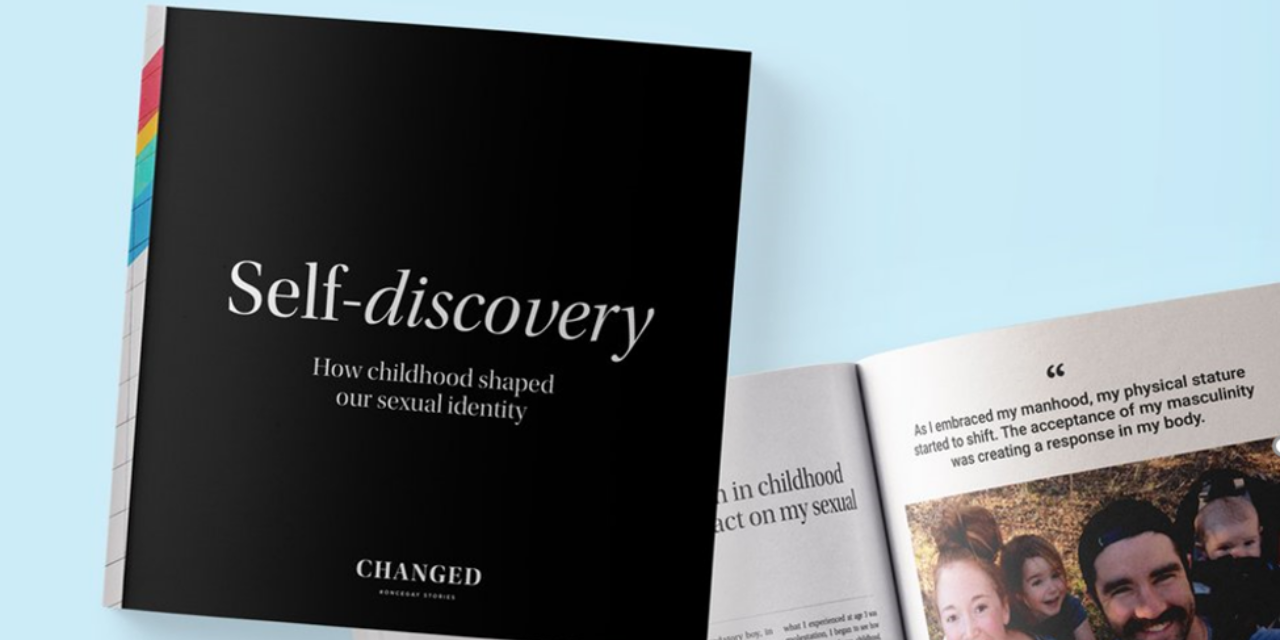October 11 is “National Coming Out Day,” (NCOD) designated by activists in 1988 to encourage individuals to “come out” as gay-identified. Now under the auspices of the Human Rights Campaign (HRC), the largest LGBT activist group in the U.S., NCOD is celebrated in all 50 states and countries around the world.
The day has grown far beyond celebrating those who identify as gay. HRC says:
Whether you’re lesbian, gay, bisexual, transgender, non-binary, queer, asexual, intersex, or Two-Spirit, be proud of who you are and your support for LGBTQ+ equality this Coming Out Day!
The day is built on the premise that sexual feelings and confusion are at the core of a person’s true identity. In “coming out,” a person is supposedly saying, “This is me – my sexuality is the core of who I am and how I now express myself. Celebrate with me.”
But what if that’s not true? What if broken sexuality is not a person’s true self?
What if you struggle with sexual identity confusion or same-sex attractions, identity or behaviors, and you want to follow Christ?
What if you wrestle with your sexuality, but you believe what the Bible, Judaism and Christianity have taught for millennia: God created humans male and female in His image, and He designed marriage to be between a husband and a wife?
Thankfully, there are many Christian groups providing help and resources for those whose identity comes from their faith – not from their sexual feelings or sinful behaviors.
While corporate media, big business and social media celebrate NCOD, Christians are providing support for those walking away from an LGBT identity.
The Changed Movement is one such group, a loose connection of individuals who have left homosexuality or transgenderism. Many of them now lead ministries for those wanting freedom from homosexuality.
You can read dozens of their stories (including this writer’s) at the Changed website and in the book, Changed: #OnceGay Stories.
Aside from their desire to follow Christ, a common theme for many who wrestled with unwanted homosexuality or transgenderism is that they’ve understood and found healing for childhood experiences that helped contribute to these struggles.
The group has created a new booklet, Self-discovery: How childhood shaped our sexual identity. It explains how many in the movement “experienced shifts in our sexual feelings and gender identity as we have addressed perceptions and wounds from our childhood.”
One of those highlighted in the free, downloadable booklet is Garry Ingraham. Now an ordained pastor who directs the Love and Truth Network, Ingraham was raised in a Christian home but struggled for years with pornography, masturbation and unhealthy same-sex relationships.
Looking back on his life, he came to understand that he had an insecure relationship with his father and had “overidentified with my mom and the other women in my life.” As a young boy, Ingraham was exposed to hardcore pornography and sexual activity by older boys, and he was bullied throughout his school years.
Ingraham says:
Unable to contend with the other boys or to live up to who they were, I turned to pornography and masturbation to self-soothe. Eventually, my distorted perception of masculinity and my emotional and relational wounds drove me to same-sex sexuality. …
Full of self-hatred, I felt utterly unstable in who I was as a man and where I fit in the world. In fact, I felt like a shell of a man. Though I didn’t identify with being a woman, I didn’t feel like I fit as a man, so I felt ashamed (his emphasis).
He continues:
After years of struggling. I eventually turned to my faith for peace. I began a process of self-discovery that exposed the pressures of my childhood and enabled me to find transformation. My faith became a cornerstone in my life, and I began building stable relationships with others by attending church and intentionally seeking positive emotional connections (his emphasis).
Self-discovery and transformation. That’s a different road from “coming out.”
The Change Movement asks the question:
Imagine how different Garry’s life might have been if he’d been given the opportunity to confront his childhood insecurities and better understand his masculinity alongside a professional therapist or counselor.
If he were a young person today, he might be pressured to embrace a gay identity and never resolve his self-hatred and rejection. Like so many in the LGBTQ community, he might be outspoken about these common experiences yet never fully understand their true source to find emotional healing.
Others in the booklet tell similar stories of early exposure to pornography, childhood sexual molestation, physical abuse, broken family relationships, and inability to identify as masculine or feminine in alignment with their God-given biology.
None of them say these caused their homosexual or transgender struggles. What they do say is that those experiences, along with their reactions to them, were influential in their sexual identity development. Those experiences led to struggles with sexual identity, attractions and behaviors.
Through a variety of means, such as counseling, self-understanding, pastoral care, God’s healing, healthy relationships, renewed thinking, and experiencing God’s love, they found transformation. They were able to embrace their God-given sexual identity as male or female and to walk away from homosexuality and transgenderism.
Instead of offering self-understanding and healing, National Coming Out Day says, “No, your struggles with sexual identity, attractions and behaviors define you.”
Christian groups like Changed offer a better way, toward self-discovery and healing.
Related articles and resources:
- CHANGED: #OnceGay Stories
- Changed Stories Online
- Self-discovery: How childhood shaped our sexual identity
- Freedom from Homosexuality – What’s the Controversy?
- Is Therapy to Leave Homosexuality Damaging? New Review Says, ‘No Proof of Harm’
- Just a Good Christian Boy
- New Study Shows Therapy to Leave Homosexuality Can Be Effective and Helpful
- Is Therapy to Leave Homosexuality Damaging? New Review Says, ‘No Proof of Harm’
- What Do We Mean When We Talk About Change From Homosexuality?






